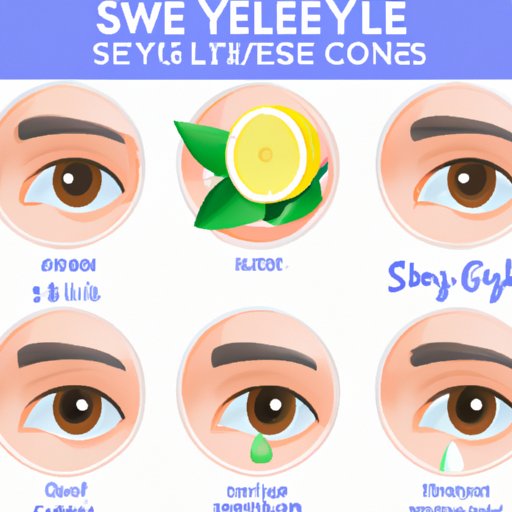Introduction
Swollen eyes can be a frustrating and uncomfortable experience for many people. Medically known as periorbital puffiness, swollen eyes can have a variety of causes including allergies, lack of sleep, and dehydration. Swollen eyes can also be a sign of a more serious underlying medical condition. It is important to know how to get rid of swollen eyes and when to seek medical attention.
Natural remedies for reducing eye puffiness
One of the easiest ways to reduce swelling in the eyes is by using natural remedies:
Cucumber slices
Cucumbers have a cooling effect on the skin and help to reduce inflammation. Place a few cold cucumber slices on the affected area for 10-15 minutes. Repeat this remedy a few times a day for effective results.
Tea bags
Black and green tea contain natural anti-inflammatory compounds that can help reduce eye puffiness. Place used tea bags in the fridge for a few minutes and put them on your eyes for 15-20 minutes. This remedy can be used daily.
Cold spoons
Placing cold spoons on your eyes can help reduce eye puffiness. Chill metal spoons in the fridge for a few minutes then place them on the affected area until the spoons lose their chill.
Aloe vera gel
Aloe vera has anti-inflammatory properties that can help reduce swelling in the eyes. Apply pure aloe vera gel to the affected area and leave it on for 10 to 15 minutes. Rinse with cold water. Repeat this remedy a few times a day.
Potato slices
Raw potatoes have astringent properties that can help reduce inflammation and swelling in the eyes. Slice potatoes and place them in the fridge for a few minutes until they are cold. Then, place them on the affected area for 10-15 minutes. Repeat this remedy a few times a day.
Sleep hygiene tips to reduce eye puffiness
Sleep plays an important role in maintaining healthy skin and reducing eye puffiness. Here are some tips for good sleep hygiene:
Avoiding alcohol and caffeine
Alcohol and caffeine can interfere with sleep patterns and cause your body to become dehydrated, leading to eye puffiness. It is best to avoid consuming alcohol and caffeine before bed.
Using electronic devices before bed
Blue light from electronic screens can interfere with natural sleep rhythm. Avoid using electronic devices for at least one hour before bed to promote healthy sleep
Sleeping position
Sleeping on the back can help prevent fluid from building up under the eyes. Using a pillow to elevate your head may also help to reduce eye puffiness.
Using a humidifier
Dry air can cause eye puffiness. Use a humidifier in your bedroom to keep the air moist and reduce puffiness around the eyes.
The role of diet in reducing eye puffiness
Dietary choices can play a significant role in reducing eye puffiness. Here are some tips for making good dietary choices:
Foods and drinks that cause water retention
Processed foods, salt, and alcohol can all cause your body to retain water and lead to eye puffiness. Avoiding these foods and drinks can reduce puffiness around the eyes.
Anti-inflammatory foods
Foods that have anti-inflammatory properties can help reduce inflammation in the body that can contribute to eye puffiness. Some examples of anti-inflammatory foods include fruits, vegetables, oily fish, nuts, and seeds.
Hydration
Dehydration can cause fluid retention, which can lead to eye puffiness. Drinking plenty of water, herbal tea, and eating foods with high water content can all help to keep you hydrated and reduce eye puffiness.
Lifestyle changes to reduce eye puffiness
Lifestyle changes can also play a role in reducing eye puffiness:
Smoking cessation
Smoking can cause damage to the skin and lead to premature aging, which can contribute to eye puffiness. Quitting smoking or minimizing exposure to smoke can help reduce puffiness around the eyes.
Reducing alcohol consumption
As mentioned earlier, alcohol can cause water retention and contribute to eye puffiness. Reducing alcohol consumption can help reduce puffiness around the eyes and improve overall health.
Stress management techniques
Stress can cause inflammation in the body, contributing to eye puffiness. Incorporating stress management techniques such as meditation, yoga, or deep breathing exercises can help reduce stress and reduce eye puffiness.
Exercise
Regular exercise can help reduce fluid retention and improve circulation, leading to a reduction in eye puffiness. Aim for at least 30 minutes of moderate exercise per day.
Skincare routine tips for reducing eye puffiness
Here are some tips for incorporating eye puffiness reduction into your skincare routine:
Using a gentle eye cream
Eye creams containing caffeine, green tea extract, or retinol can help reduce eye puffiness. Look for products that are specifically designed for reducing eye puffiness.
Avoiding rubbing the eyes
Constant rubbing of the eyes can cause skin irritation and contribute to eye puffiness. It is best to avoid rubbing your eyes and to gently pat them dry instead of wiping them.
Applying cool compresses
Cool compresses can help reduce swelling and puffiness in the eyes. Soak a clean cloth in cold water and place it on the affected area for a few minutes. Repeat as needed.
Getting enough sleep
As mentioned earlier, getting enough sleep is important for reducing eye puffiness. Incorporating good sleep hygiene habits and developing a consistent sleep schedule can help to ensure that you get enough sleep.
Conclusion
Swollen eyes can be uncomfortable and frustrating, but there are many natural remedies, sleep hygiene tips, dietary changes, lifestyle changes, and skincare routine tips that can help to reduce eye puffiness. Experiment with different remedies until you find what works best for you. If symptoms persist, it is always important to consult a doctor.
